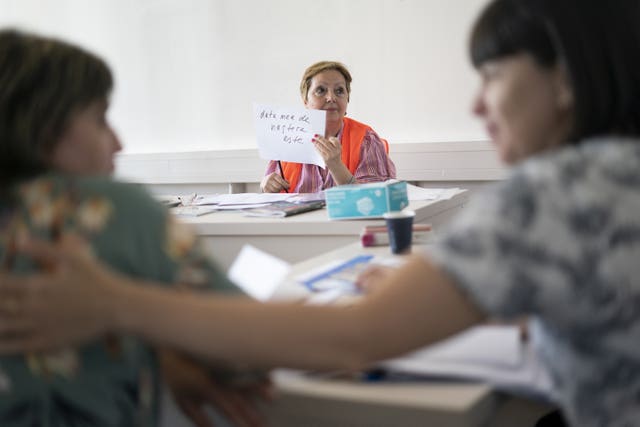Grandmother who fled Ukraine war on crutches now teaching refugees Romanian
Milena Ivakova said she thinks fellow refugees have to help each other during the war.

A grandmother has described escaping her home in Ukraine to Romania on crutches after the war with Russia broke out.
Using a pseudonym, Milena Ivakova, 61, said she fled her home in Odesa, a port city in southern Ukraine, while recovering from hip replacement surgery with her 40-year-old daughter and her three granddaughters aged 10, 17, 20 and 22.
She is now working at the same refuge centre as a translator and language tutor, helping her fellow Ukrainian refugees learn Romanian so they can settle into their new home and find work.
The centre, which is run by four Romanian non-governmental organisations, has received support and donations from humanitarian aid charity World Vision.
World Vision is one of the Disasters Emergency Committee’s (DEC) member charities working directly or through local partners in Ukraine and in neighbouring countries to help the humanitarian crisis.
Ms Ivakova and her family arrived in Iasi, a city in north eastern Romania and 200 miles north of the capital Bucharest, on March 9, having fled their native country the day before.
They travelled by bus, car and walking before reaching their new home. The family left behind Ms Ivakova’s son-in-law, who is a priest, and her two cats who he is looking after.
After arriving at a friend’s flat in the city, Ms Ivakova went to the refuge centre to seek supplies, including hygiene products and food, also have a doctor check her hip following the surgery.
Speaking through a translator, Ms Ivakova told the PA news agency: “(Fleeing Ukraine) was stressful.
“It was just after my surgery.
“I really needed to have doctor’s assistance to check my wound and to have special medication.
“I had no choice (but to flee after the surgery).
“I walked three kilometres with crutches (nearly two miles) and then flagged down a car which drove me to the border while the rest of my family walked 10 kilometres (six miles).
“I couldn’t walk any longer than that.”
Ms Ivakova said while the family is grateful to the help and support they have received from Romanians, their “hearts and souls” remain in Ukraine.
“We talk with my son-in-law every day,” she said.
“It’s still very dangerous and unsafe where he is now.
“Physically, I feel a lot better since my surgery as time is passing and my wound has closed, and now I can walk with just one crutch.
“Emotionally, I am so grateful to Romanians as they’ve helped us so much and still are helping all our people.
“They gave us food, they gave us clothes, they gave us everything.

“We care very much about everything which is happening back at home.
“We think about it daily, we check the news, we’re here but our souls and hearts are still in Ukraine.
“Not just my son in law but my friends, my colleagues, my whole life is back there.
“I had a conversation with one of my friends the other day while she was standing on a balcony at her home and I was talking to her, I saw the airport runway (in Odesa) being demolished from the bombing.
“She stopped the conversation and hid in a shelter.”
She said she and her family will remain in Romania for the time being but want to return to Odesa when it is safe to do so.
Since the end of March, Ms Ivakova, who is normally a language teacher in Ukraine, has been giving Romanian language lessons to her fellow refugees in the centre.
Explaining why she decided to do so, she said: “I believe that we do have to help each other.
“I still need help, I still receive help.
“We feel safe, we feel comfortable and I feel like we’re cared for and protected in Romania.
“We feel like this place is our family.
“I don’t feel like I come here as my work place, it feels like my home.”
More than £300 million has been raised so far by DEC after it launched its Ukraine Humanitarian Appeal in March.
Some of the money raised has gone towards World Vision, which is providing shelter kits, temporary sanitation facilities, food, child friendly spaces kits, mental health psycho-support and training of local stakeholders in mental health psycho-social support and gender-based violence referrals for the refugees.
To donate towards DEC’s appeal, visit: www.dec.org.uk





